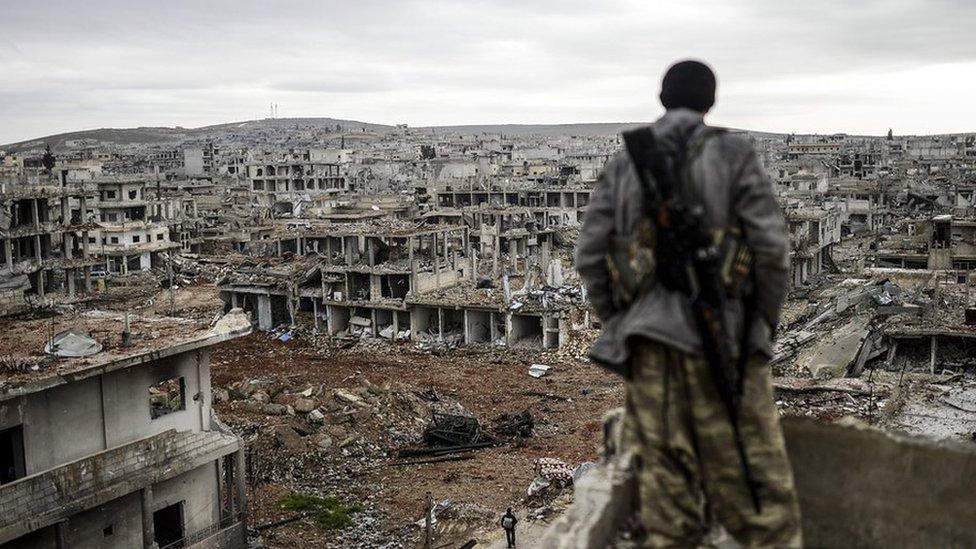ISIS fighters caught, Syria remains war torn
February 9, 2018 | Expert Insights

The United States has announced the capture of two members of the ISIS group “Beatles”, Alexanda Kotey and El Shafee Elsheikh. The two were captured by the Syrian Democratic Forces.
Even though the international community has seen some success at curbing ISIS, the conflict in Syria continues. The internal parties who are currently engaged in war are backed by the international players with conflicting interests and this has resulted in a continued humanitarian crisis in the country.
Background
Over the span of several centuries, Syria, which was at the forefront of the Islamic Caliphate, witnessed multiple invasions and occupations: from the Romans, to the Crusaders, to the Turks.
The current conflict, the Syrian Civil War, has been going on since 2011. It began during the Arab Spring protests due to resentment towards the government of President Bashar al-Assad. The war is being fought by several factions. The Syrian government and its allies, have been facing against a loose alliance of Sunni Arab rebel groups (including the Free Syrian Army) since the uprising. These rebels have been pushed back into a few areas of control largely with the help of Iranian and Russian backing.
The majority-Kurdish Syrian Democratic Forces (SDF), in the North and East of the country, are backed by the US in the fight against the Islamic State. However Turkey has expressed displeasure with the Kurdish presence at their border and entered North-western Syria to attack a Kurdish militia in January. Turkey is an ally in the fight against ISIL.
ISIL or ISIS is the Islamic State of Iraq and the Levant, a Salafi jihadist militant group and unrecognized proto-state that follows a fundamentalist, Wahhabi doctrine of Sunni Islam. It gained prominence in early 2014 when it drove Iraqi government forces out of key cities, followed by its capture of Mosul. It is known for its videos of beheading of both soldiers and civilians, including journalists and aid workers, and its destruction of cultural heritage sites. The UN holds ISIL responsible for human rights abuses and war crimes. Amnesty International has charged the group with ethnic cleansing on a “historic scale” in northern Iraq.
Beginning in October 2016, the Iraqi army launched one of its most aggressive offensives against ISIL. By February 2017, it had recaptured Western Mosul. They were routed from their de-facto “capital” Raqqa by US-supported Krudish forces. In a consorted effort with Russian and Syrian-backed forces, their territory in Syria has been constricted to a small strip in the East, where they battle largely through insurgency tactics.
Analysis
On the 8th of February, the New York Times reported the capture of the last 2 members of the infamous group within ISIS dubbed the “Beatles”. The Beatles were a group 4 Islamic State militants from West London known for their role in the torture and beheadings of more than 27 Western hostages, according to US State reports. Two members were already accounted for: Mohammed Emwazi, also known as “Jihadi John”, who was killed in a drone strike on Raqqa in 2015, and Aine Davis, who was captured in 2017 and is currently imprisoned in Turkey. Emwazi in particular was notorious for appearing in the videos showing the beheading of US journalists Sotloff and Foley, as well as aid workers such as Kassig, Haines, and Henning.
The last two members, Alexanda Kotey and El Shafee Elsheikh, were reportedly captured mid-January by the Syrian Democratic Forces. The Kurdish group handed them over to American Special Operations forces after suspecting that they were foreign fighters & their identities were consequently confirmed. According to Colonel John Thomas, spokesperson for US Central Command, they are currently being interrogated. US and Kurdish forces are still conducting searches for ISIL fighters on the Syrian-Iraqi border.
Despite the victories against the jihadi group in the past year, Syria remains plagued by conflict. On Wednesday (7th) night, the United States led air strikes against pro-Regime forces in the oil-rich Deir al-Zour province. US military command claimed that the strike was in response to an “unprovoked attack” by Assad on the SDF. “In defence of coalition and partner forces, the coalition conducted strikes,” Central Command said on Thursday.
Meanwhile, human rights groups have reported that Syrian government air strikes in the rebel stronghold of Eastern Ghouta killed 59 civilians and injured 139 on Thursday. At least 29 people were killed during similar strikes in Idlib on Monday, when Chlorine gas was also purportedly used. This month alone, Syrian and Russian strikes have reportedly killed over 100 civilians. Since December, over 300,000 new refugees have been created due to continued conflict.
On Tuesday the UN called for a month-long ceasefire in light of increasing conflict. France has also urged an end to the fighting and the opening of corridors for humanitarian aid. Russia on Thursday said that it is unlikely that there will be a ceasefire.
Assessment
Our assessment is that the Syrian crisis has intensified in recent months, resulting in the increased loss of civilian lives. Turkey’s recent actions will complicate ties between Istanbul and Washington. A resolution to this conflict must start with the establishment of a clear political process and a commitment by all parties to peace. We also believe that while ISIS has been pushed back, the organization remains a significant threat.








Comments